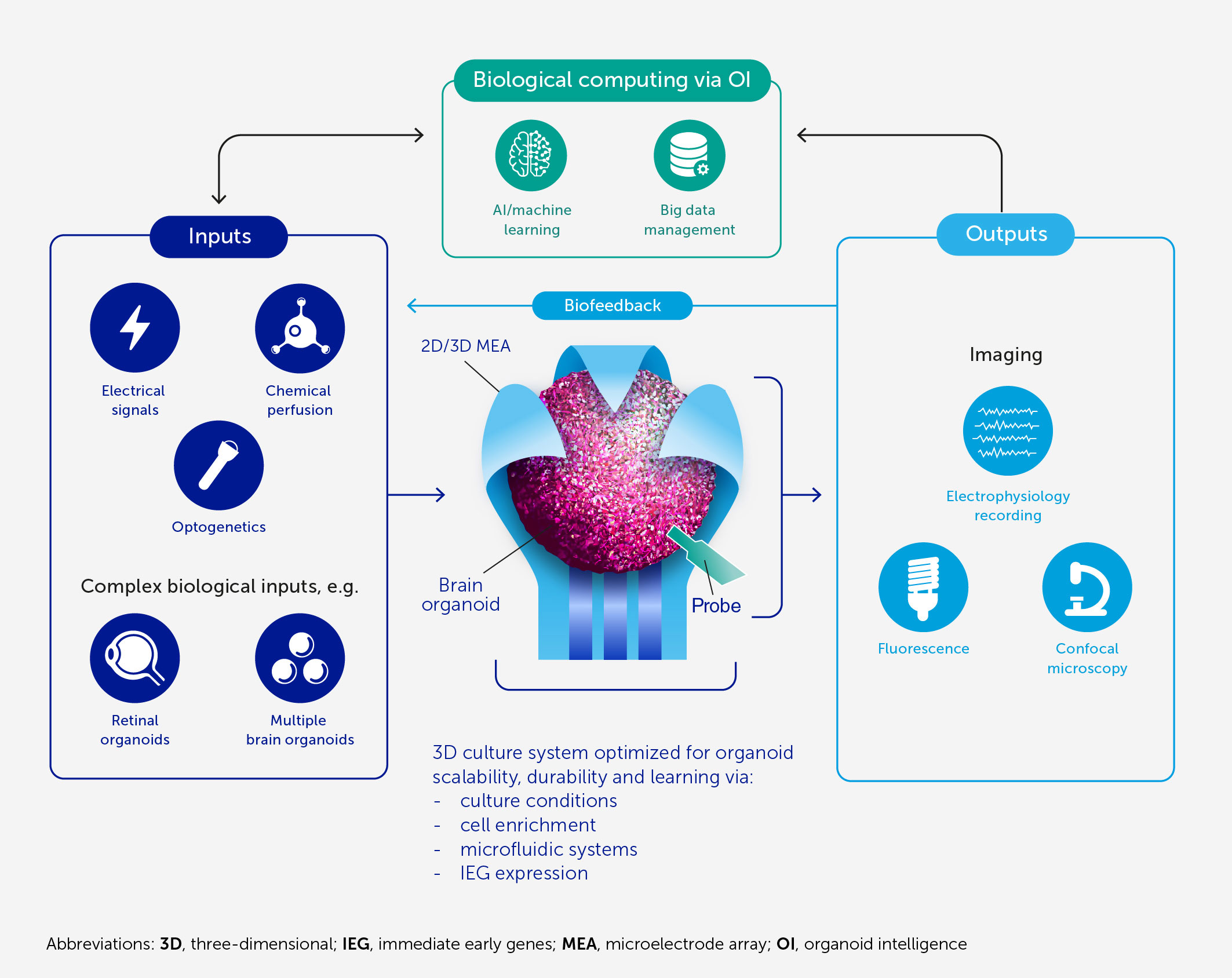Ahmedabad
(Head Office)Address : 506, 3rd EYE THREE (III), Opp. Induben Khakhrawala, Girish Cold Drink Cross Road, CG Road, Navrangpura, Ahmedabad, 380009.
Mobile : 8469231587 / 9586028957
Telephone : 079-40098991
E-mail: dics.upsc@gmail.com

Organoid Intelligence
News: Recently, Scientists have outlined a plan for a potentially revolutionary new area of research called “organoid intelligence”, which aims to create “bio computers”, where 3D brain cultures grown in the lab are coupled to real-world sensors and input/output devices.
About:
Scientists expect the technology to harness the processing power of the brain and understand the biological basis of human cognition, learning, and various neurological disorders.
These “mini-brains” (with a size of up to 4 mm) are built using human stem cells and capture many structural and functional features of a developing human brain. It is used to study human brain development and test drugs to see how they respond.
However, Brain organoids developed in the lab are not advanced enough as they lack the required sensory inputs and blood circulation that are necessary for the development of a complex organ like the human brain.
Moreover, Scientists transplanted human brain organoid cultures into rat brains and observed that they formed connections with the rat brain and showed functional activity. This system could provide a way to study brain diseases in a human context.
However, the organoids are still in the rat-brain microenvironment, which may not be representative of the human brain.
What are new age Biocomputers?
Researchers plan to combine brain organoids with modern computing methods using machine learning to create “bio-computers”.
They will grow organoids inside structures with multiple electrodes that can record the firing patterns of neurons and mimic sensory stimuli.
Machine-learning techniques will then be used to analyse the effect of neuron response patterns on human behavior or biology.
Scientists have already grown human neurons on a microelectrode array and trained them to generate electrical activity similar to what electrons would generate while playing table tennis.
What are applications of Bio Computers?
Brain organoids developed using stem cells from individuals with diseases like Parkinson's disease and microcephaly can aid drug development for these conditions.
These organoids can provide insights into the biological basis of human cognition, learning, and memory by comparing the data on brain structure, connections, and signaling between healthy and patient-derived organoids.
While human brains are slower than computers at simple arithmetic, they outshine machines at processing complex information.
Way Forward
Currently, brain organoids have a diameter of less than 1 mm, roughly three-millionth the size of an actual human brain. So, scaling up the brain organoid is key to improving its computing capacity.
Neural recordings from each neuron and connection will be needed to store and analyse using ‘Big Data’ infrastructure.
Researchers will also have to develop microfluidic systems to transport oxygen and nutrients, and remove waste products.
There is also a need to identify, discuss, and analyse ethical issues as they arise in the course of this work.
Case Study
While biological computers aren’t as prolific as personal computers, there are several companies working to advance this very young field.
Microsoft’s foray into biological computing is called Station B. The company partnered with Princeton University and two UK companies, Oxford BioMedica and Synthace, on the new research system that can analyze volumes of biomedical data with a set of integrated computer programs. This analysis is then used to guide scientists on the best way to proceed with research, such as editing DNA in a certain way. The hope is that this system will ultimately lower the cost of gene-therapy products to bring them to many more patients.

Address : 506, 3rd EYE THREE (III), Opp. Induben Khakhrawala, Girish Cold Drink Cross Road, CG Road, Navrangpura, Ahmedabad, 380009.
Mobile : 8469231587 / 9586028957
Telephone : 079-40098991
E-mail: dics.upsc@gmail.com
Address: A-306, The Landmark, Urjanagar-1, Opp. Spicy Street, Kudasan – Por Road, Kudasan, Gandhinagar – 382421
Mobile : 9723832444 / 9723932444
E-mail: dics.gnagar@gmail.com
Address: 2nd Floor, 9 Shivali Society, L&T Circle, opp. Ratri Bazar, Karelibaugh, Vadodara, 390018
Mobile : 9725692037 / 9725692054
E-mail: dics.vadodara@gmail.com
Address: 403, Raj Victoria, Opp. Pal Walkway, Near Galaxy Circle, Pal, Surat-394510
Mobile : 8401031583 / 8401031587
E-mail: dics.surat@gmail.com
Address: 303,305 K 158 Complex Above Magson, Sindhubhavan Road Ahmedabad-380059
Mobile : 9974751177 / 8469231587
E-mail: dicssbr@gmail.com
Address: 57/17, 2nd Floor, Old Rajinder Nagar Market, Bada Bazaar Marg, Delhi-60
Mobile : 9104830862 / 9104830865
E-mail: dics.newdelhi@gmail.com